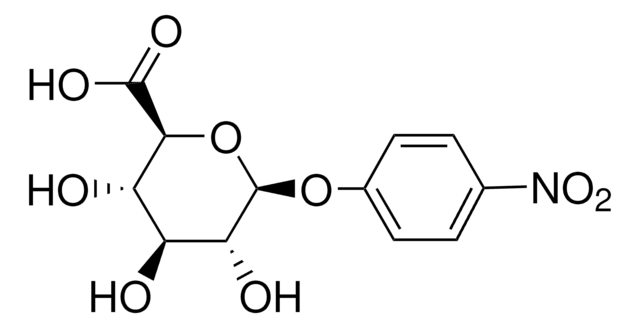M2405
4-Methylumbelliferyl β-D-lactopyranoside
β-galactosidase substrate, ≥98.00% (TLC), powder
Synonyme(s) :
4-Methylumbelliferyl β-D-lactoside
About This Item
Produits recommandés
product name
4-Methylumbelliferyl β-D-lactopyranoside, β-galactosidase substrate
Niveau de qualité
Pureté
≥98.00% (TLC)
Forme
powder
Solubilité
water: 9.80-10.20 mg/mL, clear, colorless to faintly yellow
Fluorescence
λex 365 nm; λem 445 nm (after enzymatic degradation)
Température de stockage
−20°C
Chaîne SMILES
CC1=CC(=O)Oc2cc(O[C@@H]3O[C@H](CO)[C@@H](O[C@@H]4O[C@H](CO)[C@H](O)[C@H](O)[C@H]4O)[C@H](O)[C@H]3O)ccc12
InChI
1S/C22H28O13/c1-8-4-14(25)32-11-5-9(2-3-10(8)11)31-21-19(30)17(28)20(13(7-24)34-21)35-22-18(29)16(27)15(26)12(6-23)33-22/h2-5,12-13,15-24,26-30H,6-7H2,1H3/t12-,13-,15+,16+,17-,18-,19-,20-,21-,22+/m1/s1
Clé InChI
PRTGXBPFDYMIJH-KSFLKEQHSA-N
Vous recherchez des produits similaires ? Visite Guide de comparaison des produits
Application
Actions biochimiques/physiologiques
Code de la classe de stockage
11 - Combustible Solids
Classe de danger pour l'eau (WGK)
WGK 3
Point d'éclair (°F)
Not applicable
Point d'éclair (°C)
Not applicable
Certificats d'analyse (COA)
Recherchez un Certificats d'analyse (COA) en saisissant le numéro de lot du produit. Les numéros de lot figurent sur l'étiquette du produit après les mots "Lot" ou "Batch".
Déjà en possession de ce produit ?
Retrouvez la documentation relative aux produits que vous avez récemment achetés dans la Bibliothèque de documents.
Les clients ont également consulté
Notre équipe de scientifiques dispose d'une expérience dans tous les secteurs de la recherche, notamment en sciences de la vie, science des matériaux, synthèse chimique, chromatographie, analyse et dans de nombreux autres domaines..
Contacter notre Service technique










